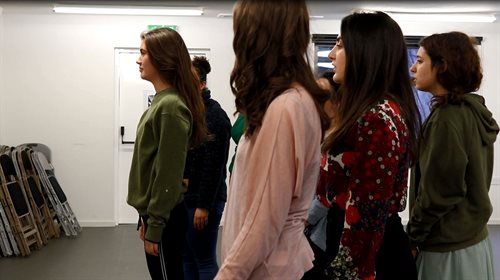From 9am on Tuesday (6 February), costumed Drama students will be proceeding from Egham High Street to Founder's Square where they will then be carrying out a number of interactive performances throughout the afternoon.
We caught up with a few of them in their rehearsals to understand what it means for them to take part in Staging Suffrage, and why they chose their suffragette characters. Here's what they had to say...

"Over the past few weeks we have spent a lot of time gathering information, looking into the university archives, carrying out research around the suffragette movement in England, and then choosing characters that we like to base stories off of that illustrate qualities of the movement.
The day will start with a precession through Egham beginning at Egham station, we will then walk up to campus and begin an interactive performance in Founder’s Square at 11.15am, another one in the Picture Gallery at 1.15pm and then for the final time at 2.15pm again in Founder’s Square. It would be great for many of you to come along, not only to watch, but to gain a general understanding of the Suffrage Movement and catch a glimpse of what many women went through.
Emmeline Pankhurst
The suffragette I will be playing is Emmeline Pankhurst, who was the leader of the suffragette movement. As I am currently researching Pankhurst, Rebecca (our director) suggested that I take part to read out her main speech in which she encourages the women to be militant with their actions.
In the research I have carried out on Pankhurst, I have found that she was a very strong woman. She had five children, but her husband was very supportive, which was quite interesting to see during that time. By her husband actively supporting the suffragette movement, it shows it was not just women who were united, but many males also played a part. From a young age, Pankhurst’s family were very much into protesting for rights, and in particular for women, which I think helped to shape her drive and passion
I feel very proud to be presenting such a strong and passionate women, who inspired so many other women, many of whom are being represented within our Staging Suffrage.
Elizabeth Garrett Anderson
The suffragette I will be playing is Elizabeth Garrett Anderson who was the first female doctor in England. Over the years, she had a lot of informant in the suffrage movement and from a very young age fought for women’s rights, women’s sexual health and women’s education, with a lot of support from her father. Anderson also went on to become the first female mayor.
However, she also portrayed much of the other side of the suffragette movement – some people have the perception of it being very focused on protests and talks, whereas, Anderson placed a large focus on helping and providing opportunities for many different women.
The reason I chose to play Anderson is not only was she the first woman to have typical male roles, but she also reflects the politics of the whole movement – she was a middle class privileged well educated woman, but she really portrayed how the suffragette movement was for all women, and how every woman deserves health, rights, and freedom of speech.
Annie Kenney
The suffragette I have chosen to play is Annie Kenney, who was a working class woman. Kenney was very close friends with Emily Pankhurst, who acted as a strong role model to Kenney, guiding and leading her through much of the suffragette movement.
Kenney was very working class, but much like Anderson, she then became one of the leaders within the movement, which was a very unusual role for a working class person to take. She was very feisty and more brutal in the way that she went about things. For example, she was arrested 13 times in which she then became part of the ‘cat and mouse’. This involved the women starving themselves in prison to the point where they became very close to death. When they became too ill, they were removed from the prisons, but as soon as they were well enough they would be placed back into prison, consequently leading her to become imprisoned so many times.
The fact that she went through all of that shows how strongly she felt about the movement. It’s her grit and determination that I admire the most."